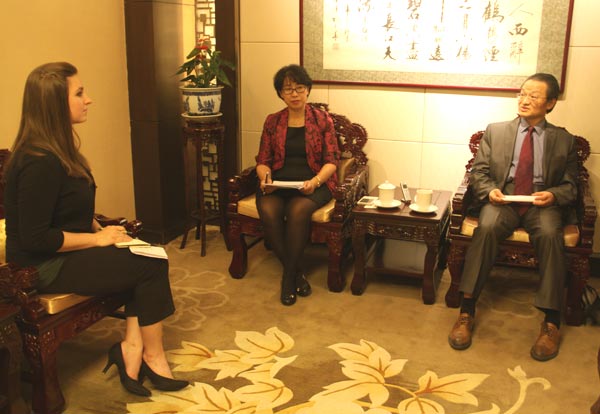UNEP Partnership Ensures Bright Future for China's Green Economy
chinagate.cn by Victoria Cole, June 30, 2015 Adjust font size:
Ms. Zhou Guomei, Vice Director of China Center for SCO Environmental Cooperation, and Mr. Sheng Fulai, Head of Research and Partnership Unit, Economics and Trade Branch, UNEP, sat down with China.org.cn to discuss the future of China's sustainability and green economy transformation and their organizational partnership.
Interviewed June 11th at a high-levelworkshop, Mr. Sheng explained, "China is shifting from a high-carbon, high-input economy to a low-carbon, resource-efficient one", requiring a "new generation of capital", including "natural capital, green technology and clean energy and increased capacity of labor to acquire green job skills." To fully utilize such resources, he explained how measuring China's green economy development should comprise of three sectors: environment (e.g. CO2 emission levels and natural resource conservation), society (e.g. public exposure to pollution and access to clean water, energy and sanitation), and economy (e.g. the growth of environmental industry and related job creation). "China is the world’s largest investor in renewable energy technologies," Mr. Sheng said, "and I am also impressed by China's environmental industry sector, growing at 15%-20% in recent years."
When referring to their organizations’ recent partnership, Mr. Sheng described that the "South-South Cooperation in Mongolia and Central Asia Countries" is "really, first of its kind." He said a lot of work had already been done at country levels, and there was a need to bring those countries together to share experiences. Ms. Zhou, in agreement, said that the partnership established "a starting point for future projects" and said, in light of all the progress to be made, their organizational relationship "will not just continue, it will deepen." Mr. Sheng also hoped, "In terms of the future …to have further engagement beyond our present activities."

After all, promotion of the green economy is critically important as plans for "the Belt and the Road" and the 13th 5-year plan are being made. According to Ms. Zhou, the economic and social wellbeing of the Chinese people will improve greatly over the next five years; whereas improvements to the environment will take longer. She says, "People enjoy the economic wealth, but if they cannot breathe clean air, if they cannot see the blue sky, that's not wealth..." Both agreed that integrating environmental targets into central decisions will need to be a priority – their biggest challenge, as well as their biggest opportunity.